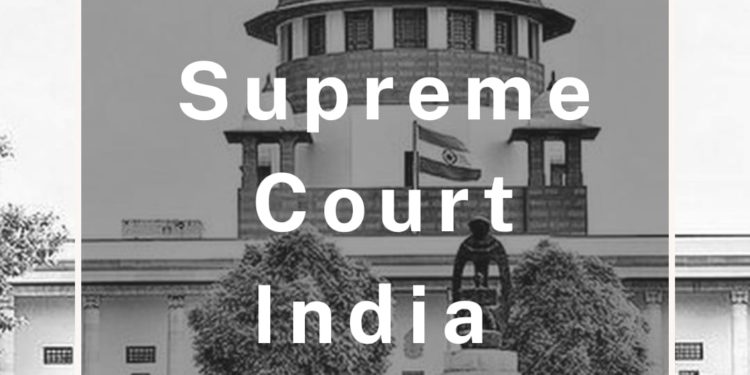The Supreme Court in its recent judgement observed that ‘mere quarrel on the day of occurrence cannot attract the offence of abetment of suicide under section 306 of the Indian Penal Code.’
The bench of Justices MR Shah and Aniruddha Bose reiterated that mere harassment without any positive action on the part of the accused proximate to the time of occurrence which led to the suicide would not amount to an offence under Section 306.
Case:
Following some quarrel, both the accused (husband) and his wife consumed pesticide. The accused survived, but his wife died due to consuming the pesticide. Following a complaint filed by brother of the deceased woman, a chargesheet was filed against the accused for the offence under Section 306 IPC.
Trial Court
The Trial Court convicted him under Section 306 IPC and sentenced him to undergo 7 years Rigorous Imprisonment (RI) and to pay a fine of Rs 2500 and also for the offence under Section 4(b) of the Tamil Nadu Prohibition of Harassment of Women Act and sentenced him to undergo three years RI and to pay a fine of Rs 2500.
Madras High Court
The Madras High Court upheld the conviction.
Supreme Court
In appeal, the court noted that the marriage between the accused and the deceased took place before 25-years and therefore, the presumption under Section 113-A of the Evidence Act shall not arise.
With regards to Section 306 IPC, the top court observed:
Now so far as the offence under Section 306 IPC is concerned, in a case where if any person instigates other person to commit suicide and as a result of such instigation the other person commits suicide, the person causing the instigation is liable to be punished for the offence under Section 306 IPC for abetting the commission of suicide.
Therefore, in order to bring a case within the provision of Section 306 IPC, there must be a case of suicide and in the commission of the said offence, the person who is said to have abetted the commission of suicide must have played an active role by an act of instigating or by 6 doing a certain act to facilitate the commission of suicide.
As observed and held by this Court in the case of Amalendu Pal (supra), mere harassment without any positive action on the part of the accused proximate to the time of occurrence which led to the suicide would not amount to an offence under Section 306 IPC.
The court added that abetment by a person is when a person instigates another to do something and instigation can be inferred where the accused had, by his acts or omission created such circumstances that the deceased was left with no other option except to commit suicide. While allowing the appeal, the court said, the court remarked,
In the instant case, the allegation against the appellant is that there was a quarrel on the day of occurrence. There is no other material on record which indicates abetment. There is no material on record that the appellant-accused played an active role by an act of instigating the deceased to facilitate the commission of suicide.
On the contrary, in the present case, even the appellant-accused also tried to commit suicide and consumed pesticide. Under the circumstances and in the facts and circumstances of the case and there is no other material on record which indicates abetment, both the High Court as well as the learned trial Court have committed an error in convicting the accused for the offence under Section 306 IPC.
ALSO READ –
Tamil Nadu Cop Dies By Suicide After Fight With Wife Over Diwali Day
Case Filed Against DMK Spokesman After Wife Dies By Suicide Due To Alleged Fight Over Her Grand Birthday Celebration
READ ORDER | Supreme Court Drops Abetment To Suicide Charges On In-Laws Despite Four Notes By Deceased Husband
READ ORDER | Demand Of Money Vague Term: Bombay HC Acquits Man In Wife’s Abetment To Suicide Case
ALSO WATCH –
Gender Biased Media Is Not Interested In Husband Suicide Stories
Join our Facebook Group or follow us on social media by clicking on the icons below
Join our Facebook Group or follow us on social media by clicking on the icons below
If you find value in our work, you may choose to donate to Voice For Men Foundation via Milaap OR via UPI: voiceformenindia@hdfcbank (80G tax exemption applicable)































